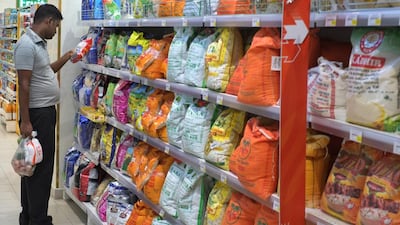Countrywide inflation rose in January to its highest level since 2009, as the effect of subsidy reform in Abu Dhabi was felt and school fees continued to rise, National Bureau of Statistics data showed yesterday.
Inflation topped 3.7 per cent in January, compared to a rate of 1.5 per cent 12 months earlier, as rising energy and water prices pushed up national inflation figures.
Householders in Abu Dhabi have seen larger utilities bills since January 1, after a cut in government subsidies in the emirate. Housing and utility costs, which account for about 40 per cent of all spending in the UAE, have risen by 7.4 per cent over the past 12 months.
“Utility subsidy reform in Abu Dhabi should feed into higher headline inflation in 2015,” said Monica Malik, the chief economist at Abu Dhabi Commercial Bank.
“The other main drivers of inflation have been domestic and population-linked – housing and education,” she said.
The cost of education rose by 4 per cent over the past 12 months, as parents competed for a shortage of available primary and secondary school places.
Falling oil prices, a strong currency and moderation in Dubai’s exuberant housing market are likely to reduce prices for many – but higher energy prices in Abu Dhabi will push up the cost of living for the capital’s residents.
“The strong dollar and weak global economy are likely to reduce imported inflation,” but it is likely that the effect of higher utilities prices will outweigh these cost reductions, Ms Malik said.
Food and drink inflation fell to 0.1 per cent, as the effect of lower import costs and a government price freeze on key items was felt.
A strong currency is reducing import prices, which in turn is forcing down inflation on textiles and food, economists said.
The US dollar and UAE dirham have strengthened against major Asian and European currencies, encouraged by expected US Federal Reserve interest rate rises this year.
Asia and Europe accounted for about three-quarters of the UAE’s imports in recent years.
The euro has fallen by about 11 per cent against the dollar over the past year, while the Indian rupee has fallen by about 7 per cent against the dollar since May 2014. India remains the UAE’s largest trade partner.
The dirham is pegged to the dollar, which means that the dollar’s rise against major international currencies has increased the dirham’s purchasing power.
Oil has more than halved in the past six months, meaning that imported goods are cheaper as transport costs fall, said Alp Eke, senior economist at National Bank of Abu Dhabi. But the majority of inflation in the UAE is caused by the country's rapidly-growing population, and the strains this places on housing and education, he said.
Economists predicted that inflation in Dubai would probably fall over the next 12 months.
Inflation in Dubai hit 4.5 per cent in January, as price rises in the nation's most populous emirate continued. But with the real estate consultancy JLL predicting that rents in the emirate will fall by an average of 10 per cent over the next 12 months, economists are predicting this trend will reverse.
Official inflation figures are likely to continue to show increases in housing for a number of months, even as the real estate market cools off. That is because official statistics lag developments in the economy.
Inflation in Fujairah, Sharjah and Ajman fell slightly against the previous month.
abouyamourn@thenational.ae
Follow The National's Business section on Twitter

